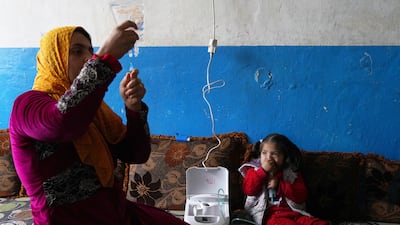Lebanon has appealed to the UK to help with its growing poverty and refugee crises as its ambassador revealed that 80 per cent of the population are in need of assistance.
Rami Mortada, the Lebanese ambassador to Britain, made a plea to the international development committee for help.
Mr Mortada said Lebanon was now at "breaking point" because of the number of refugees it accepted and from its own economic problems.
But the UK's aid watchdog, the Independent Commission for Aid Impact, published a report on Wednesday warning that the UK "no longer" had the ability to respond to human rights work as it once did, after its budget was slashed by a third.
On Tuesday, Mr Mortada told the committee that Lebanon was in "dire need" of assistance.
"Originally, the refugee population was considered vulnerable," he said. "Now nearly 80 per cent of the host country is vulnerable and in desperate need of assistance.
"We have a population of four million and we are hosting 1.5 million Syrian refugees and 200,000 Palestinian refugees.
"Around half the population of Lebanon are refugees, which is a considerable burden in financial and economic terms.
"It is now over 10 years into the Syria crisis and you can imagine the tensions that arise and the political uncertainties as to the future of their presence.
"Now, 80 per cent of the Lebanese population are below the poverty line, 34 per cent under the extreme poverty line.
"Prior to 2019 the target group for assistance was the refugees. Now, today priorities should be recalibrated.
"The 2019 economic meltdown should be taken into account in redesigning the support scheme."
Mr Mortada said with Lebanon's economy being in "freefall" since 2019, the nation was in desperate need of help and the global community must find a sustainable solution to deal with the refugee crisis.
"We need help to assist the national economy for it to be able continue assisting the refugees," he said.
"The country is at breaking point."
He said Lebanon had been forced to close its schools due to teachers striking over low pay and it was in "desperate" need of assistance to reopen them.
Mr Mortada said that initially, schools for Lebanese children were closed while schools for refugees, which were funded by international aid money, had remained open.
The animosity it caused, he said, led to the Education Minister closing all schools.
"It is painful what you are telling us," the committee's chairwoman Sarah Champion said.
Her colleague Pauline Latham warned that the issue would "create huge problems for the future".
But Mr Mortada's appeal came before the ICAI's report was published.
It warned that budget cuts and a rapid turnover of foreign ministers would have a major effect on the UK's global human rights work in the future.
It says the UK’s democracy and human rights work has delivered useful results but has been significantly affected by the cuts and the lack of a strategic framework.
According to the report, the expenditure in this area was reduced by 33 per cent in 2020, and the rapid turnover of UK government ministers has resulted in the "lack of a clear strategy".
ICAI warns that, from 2020 on, the UK no longer has the ability to respond to new challenges and deliver on the UK government’s high policy ambitions in this area.
It also says that, after another change in foreign secretary in September 2022, when James Cleverly was appointed, and discussions of a revision of the Integrated Review — the UK's national security and international policy — there is "more uncertainty" ahead.
“Promoting democracy and human rights around the world is an important objective for UK aid, particularly considering the widespread reversal of democratic trends in recent years,” said ICAI Commissioner Tamsyn Barton said.
“We found that the UK’s work has produced useful results, including helping at-risk groups such as women and people with disabilities to advocate for their rights, combat discrimination, participate in politics and access basic services, as well as helping to create more effective political and civil society organisations.
“However, since 2020, the UK has been less responsive to emerging democracy and human rights challenges, due to the aid budget reductions and the loss of technical expertise within the FCDO [Foreign, Commonwealth and Development Office].
"In principle, the merged FCDO should be better placed to deploy its development and diplomatic tools together, but this potential has not yet been realised in practice.”
The ICAI has made recommendations including that the FCDO should publish its approach to democracy and human rights and ensure it has enough expertise to design and monitor its democracy and human rights interventions.
It should consider whether it can learn from other countries and take more risks to support people and organisations facing the most serious threats from repression, and ensure better co-ordination.


